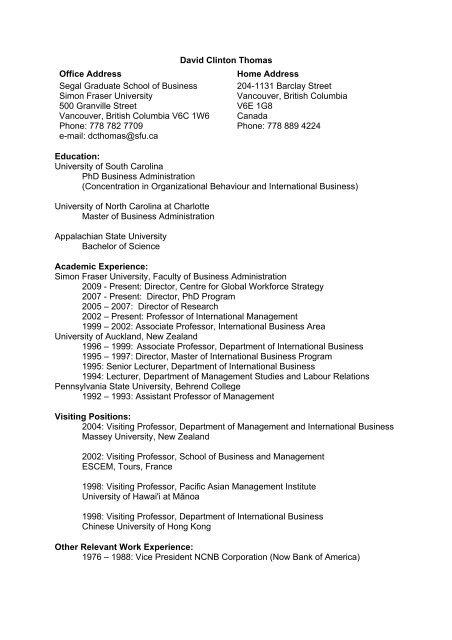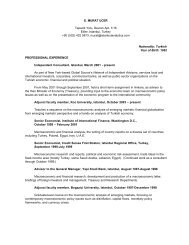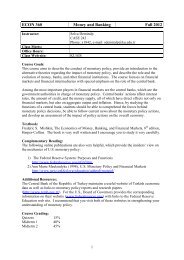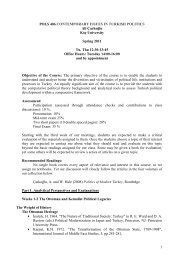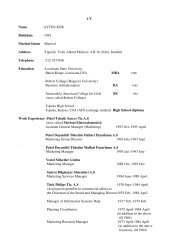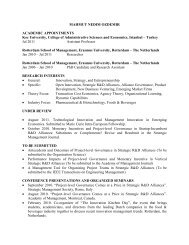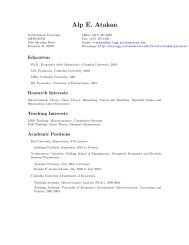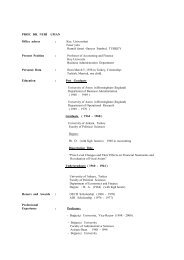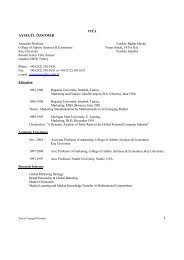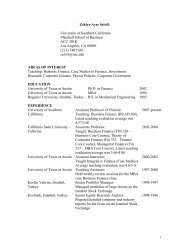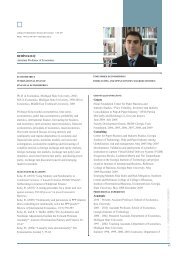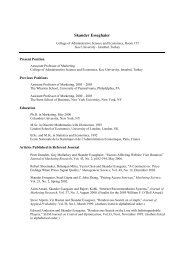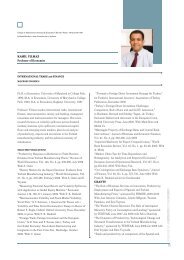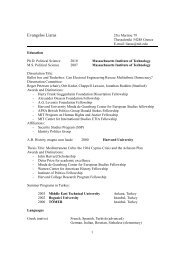David Clinton Thomas Office Address Home Address - College of ...
David Clinton Thomas Office Address Home Address - College of ...
David Clinton Thomas Office Address Home Address - College of ...
- No tags were found...
You also want an ePaper? Increase the reach of your titles
YUMPU automatically turns print PDFs into web optimized ePapers that Google loves.
<strong>Office</strong> <strong>Address</strong>Segal Graduate School <strong>of</strong> BusinessSimon Fraser University500 Granville StreetVancouver, British Columbia V6C 1W6Phone: 778 782 7709e-mail: dcthomas@sfu.ca<strong>David</strong> <strong>Clinton</strong> <strong>Thomas</strong><strong>Home</strong> <strong>Address</strong>204-1131 Barclay StreetVancouver, British ColumbiaV6E 1G8CanadaPhone: 778 889 4224Education:University <strong>of</strong> South CarolinaPhD Business Administration(Concentration in Organizational Behaviour and International Business)University <strong>of</strong> North Carolina at CharlotteMaster <strong>of</strong> Business AdministrationAppalachian State UniversityBachelor <strong>of</strong> ScienceAcademic Experience:Simon Fraser University, Faculty <strong>of</strong> Business Administration2009 - Present: Director, Centre for Global Workforce Strategy2007 - Present: Director, PhD Program2005 – 2007: Director <strong>of</strong> Research2002 – Present: Pr<strong>of</strong>essor <strong>of</strong> International Management1999 – 2002: Associate Pr<strong>of</strong>essor, International Business AreaUniversity <strong>of</strong> Auckland, New Zealand1996 – 1999: Associate Pr<strong>of</strong>essor, Department <strong>of</strong> International Business1995 – 1997: Director, Master <strong>of</strong> International Business Program1995: Senior Lecturer, Department <strong>of</strong> International Business1994: Lecturer, Department <strong>of</strong> Management Studies and Labour RelationsPennsylvania State University, Behrend <strong>College</strong>1992 – 1993: Assistant Pr<strong>of</strong>essor <strong>of</strong> ManagementVisiting Positions:2004: Visiting Pr<strong>of</strong>essor, Department <strong>of</strong> Management and International BusinessMassey University, New Zealand2002: Visiting Pr<strong>of</strong>essor, School <strong>of</strong> Business and ManagementESCEM, Tours, France1998: Visiting Pr<strong>of</strong>essor, Pacific Asian Management InstituteUniversity <strong>of</strong> Hawai'i at Mānoa1998: Visiting Pr<strong>of</strong>essor, Department <strong>of</strong> International BusinessChinese University <strong>of</strong> Hong KongOther Relevant Work Experience:1976 – 1988: Vice President NCNB Corporation (Now Bank <strong>of</strong> America)
Publications<strong>David</strong> C <strong>Thomas</strong> 2Books:<strong>Thomas</strong>, <strong>David</strong> C. & Inkson, Kerr. 2009. Cultural intelligence: Living and workingglobally. San Francisco, CA: Berrett-Koehler.<strong>Thomas</strong>, <strong>David</strong> C. 2008. Cross-cultural management: Essential concepts. ThousandOaks, CA: Sage. (Winner <strong>of</strong> the R. Wayne Pace HRD book <strong>of</strong> the year, 2008)Smith, Peter B., Peterson, Mark F., & <strong>Thomas</strong>, <strong>David</strong> C. (Eds.) 2008. The handbook <strong>of</strong>cross-cultural management research. Thousand Oaks, CA: Sage.<strong>Thomas</strong>, <strong>David</strong> C. & Inkson, Kerr. 2004. Cultural intelligence: People skills for globalbusiness. San Francisco, CA: Berrett-Koehler. (Translated into Spanish,Portuguese, Indonesian, & Japanese)Napier, Nancy J. & <strong>Thomas</strong>, <strong>David</strong> C. 2004. Managing relationships in transitioneconomies. Westport, CT: Praeger. (Both Print and Kindle Book Editions)<strong>Thomas</strong>, <strong>David</strong> C. 2003. Readings and cases in international management: A crossculturalperspective. Thousand Oaks, CA: Sage.<strong>Thomas</strong>, <strong>David</strong> C. & Lebedeva, Alexandra. 2003. Instructors manual for Readings andcases in International Management: A cross-cultural perspective. ThousandOaks, CA: Sage.<strong>Thomas</strong>, <strong>David</strong> C. 2002. Essentials <strong>of</strong> international management: A cross-culturalperspective. Thousand Oaks, CA: Sage.Refereed Journal Publications:<strong>Thomas</strong>, <strong>David</strong> C. 2010.Cultural Intelligence and all that jazz: The cognitive revolution ininternal management research. Advances in International Management (InPress)Brannen, Mary Yoko, & <strong>Thomas</strong>, <strong>David</strong> C. 2010. Bicultural individuals in organizations:Implications and opportunity. International Journal <strong>of</strong> Cross-CulturalManagement. (In Press)<strong>Thomas</strong>, <strong>David</strong> C., Fitzsimmons, Stacey R., Ravlin, Elizabeth C., Au, Kevin Y., EkelundBjörn Z., & Barzanty, Cordula. 2010. Psychological contracts across cultures.Organization Studies (In Press).<strong>Thomas</strong>, D.C., Stahl, G., Ravlin, E.C., Poelmans, S., Pekerti, A., Maznevski, M.,Lazarova, M.B., Elron, E., Ekelund, B.Z., Cerdin, J.L., Brislin, R., Aycan, Z., & Au,K. 2008. Cultural intelligence: Domain and assessment. International Journal <strong>of</strong>Cross-Cultural Management, 8, 123-143.Peterson, Mark, F., & <strong>Thomas</strong>, <strong>David</strong> C. 2007. Organizational behavior in multinationalorganizations. Journal <strong>of</strong> Organizational Behavior, 28, 262-279.
<strong>David</strong> C <strong>Thomas</strong> 3<strong>Thomas</strong>, <strong>David</strong> C. 2006. Domain and development <strong>of</strong> cultural intelligence: Theimportance <strong>of</strong> mindfulness. Group & Organization Management, 31(1), 78-99.Ravlin, Elizabeth C., & <strong>Thomas</strong>, <strong>David</strong> C. 2005. Status and stratification inorganizational life. Journal <strong>of</strong> Management, 31(6), 966-987.<strong>Thomas</strong>, <strong>David</strong> C., Lazarova, Mila B., & Inkson, Kerr 2005. Global careers; Newphenomenon or new perspectives? Journal <strong>of</strong> World Business, 40, 340-347.<strong>Thomas</strong>, <strong>David</strong> C., Au, Kevin, & Ravlin, Elizabeth C. 2003. Cultural Variation and thePsychological Contract. Journal <strong>of</strong> Organizational Behavior, 24, 451-471.<strong>Thomas</strong>, <strong>David</strong> C. & Pekerti, Andre A. 2003. Effect <strong>of</strong> culture on situational determinants<strong>of</strong> exchange behaviour in organizations: A comparison on New Zealand andIndonesia. Journal <strong>of</strong> Cross-Cultural Psychology, 34(3), 269-281.Pekerti, Andre A. & <strong>Thomas</strong>, <strong>David</strong> C. 2003. Communication in intercultural interaction:An empirical investigation <strong>of</strong> idiocentric and sociocentric communication styles.Journal <strong>of</strong> Cross-Cultural Psychology, 34(2), 139-154.<strong>Thomas</strong>, <strong>David</strong> C. & Au, Kevin. 2002. The effect <strong>of</strong> cultural differences on behaviouralresponses to low job satisfaction. Journal <strong>of</strong> International Business Studies,33(2), 309-326.Brock, <strong>David</strong> M., Barry, <strong>David</strong>, & <strong>Thomas</strong>, <strong>David</strong> C. 2000. Your forward is our reverse,your right our wrong: Rethinking multinational planning process in light <strong>of</strong> nationalculture. International Business Review, 9(6), 687-701.<strong>Thomas</strong>, <strong>David</strong> C., Ravlin, Elizabeth C., & Barry, <strong>David</strong> 2000. Creating effectivemulticultural teams. University <strong>of</strong> Auckland Business Review, 2(1), 10-25.<strong>Thomas</strong>, <strong>David</strong> C. 1999. Cultural diversity and work group effectiveness: Anexperimental study. Journal <strong>of</strong> Cross-Cultural Psychology, 30(2), 242-263.Inkson, Kerr, <strong>Thomas</strong>, <strong>David</strong> C., & Barry, Sean. 1999. Overseas experience: Increasingindividual and international competitiveness. University <strong>of</strong> Auckland BusinessReview, 1, 52-61.<strong>Thomas</strong>, <strong>David</strong> C. 1998. The expatriate experience: A critical review and synthesis.Advances in International Comparative Management, 12, 237-273.Reprinted in: Redding, G. & Stening, B. W. (Eds.) 2002. Cross-culturalmanagement. Cheltenham, UK: Edward Elgar Publishing.Brock, <strong>David</strong> M. & <strong>Thomas</strong>, <strong>David</strong> C. 1998. Planning in subsidiaries <strong>of</strong> internationalorganizations: Organizational structure, local responsiveness, and globalintegration. Research in International Business and International Relations, 7,163-181.
<strong>David</strong> C <strong>Thomas</strong> 4Ah Chong, Lee M. & <strong>Thomas</strong>, <strong>David</strong> C. 1997. Leadership perceptions in cross-culturalcontext: Pacific Islanders and Pakeha in New Zealand. Leadership Quarterly,8(3), 275-294.<strong>Thomas</strong>, <strong>David</strong> C. & Meglino, Bruce M. 1997 Effect <strong>of</strong> stimulus presentation mode oncausal attribution in an inter-cultural interaction. Journal <strong>of</strong> Cross-CulturalPsychology, 28(5), 554-568.<strong>Thomas</strong>, <strong>David</strong> C., Ravlin, Elizabeth C. & Wallace, Alan W. 1996. Effect <strong>of</strong> culturaldiversity in work groups. Research in the Sociology <strong>of</strong> Organisations, 14, 1-33.Ah Chong, Lee M. & <strong>Thomas</strong>, <strong>David</strong> C. 1995. Cross-cultural research in New Zealandorganisations: What we know and what needs to be addressed. Journal <strong>of</strong> theAustralia and New Zealand Academy <strong>of</strong> Management, 1(2), 14-32.<strong>Thomas</strong>, <strong>David</strong> C. & Ravlin, Elizabeth C. 1995. Responses <strong>of</strong> workers to culturaladaptation by a foreign manager. Journal <strong>of</strong> Applied Psychology, 80(1), 133-146.<strong>Thomas</strong>, <strong>David</strong> C. & Toyne, Brian. 1995. Subordinates' responses to cultural adaptationby Japanese expatriate managers. The Journal <strong>of</strong> Business Research, 32(1), 1-10.<strong>Thomas</strong>, <strong>David</strong> C. 1994. The boundary spanning role <strong>of</strong> expatriates in the multinationalcorporation. Advances in International Comparative Management, 9, 145-170.Klaas, Brian & <strong>Thomas</strong>, <strong>David</strong> C. 1994. The stability <strong>of</strong> individual grievance behaviour:An examination <strong>of</strong> assumptions about grievance activity. The Journal <strong>of</strong>Managerial Issues, 6(4),393-407.Feldman, Daniel C. & <strong>Thomas</strong>, <strong>David</strong> C. 1992. Career management issues facingexpatriates. Journal <strong>of</strong> International Business Studies, 23(2), 271-294.Feldman, Daniel C. & <strong>Thomas</strong>, <strong>David</strong> C. 1991. From desert shield to desert storm: Lifeas an expatriate in Saudi Arabia during the Persian Gulf Crisis. OrganizationalDynamics, Autumn, 37-46.Chapters in Books:<strong>Thomas</strong>, <strong>David</strong> C. & Liao, Yuan 2010. Inter-Cultural Interactions: The Chinese ContextIn M. H. Bond, (Ed.), The Oxford Handbook <strong>of</strong> Chinese Psychology (2 ed). NewYork: Oxford University Press (In-Press).<strong>Thomas</strong>, <strong>David</strong> C., & Fitzsimmons, Stacey R. 2008. Cross Cultural Skills and Abilities:From Communication Competence to Cultural Intelligence. In Smith, Peter B.,Peterson, Mark F., & <strong>Thomas</strong>, <strong>David</strong> C. (Eds.) 2008. The Handbook <strong>of</strong> Cross-Cultural Management Research (pp. 201-218) Thousand Oaks, CA: Sage.Smith, Peter B., Peterson, Mark F., & <strong>Thomas</strong>, <strong>David</strong> C. 2008. Introduction. In Smith,Peter B., Peterson, Mark F., & <strong>Thomas</strong>, <strong>David</strong> C. (Eds.) 2008. The Handbook <strong>of</strong>Cross-Cultural Management Research (pp. 3-14). Thousand Oaks, CA: Sage.
<strong>David</strong> C <strong>Thomas</strong> 5<strong>Thomas</strong>, <strong>David</strong> C. & Inkson, Kerr. 2007. Careers across cultures. In H. P. Gunz & MPeiperl (Eds.) Handbook <strong>of</strong> Career Studies (pp. 451-470) London: SagePublications.<strong>Thomas</strong>, <strong>David</strong> C. & Lazarova, Mila, B. 2006. Expatriate adjustment and performance: Acritical review. In G. Stahl & I. Björkman (Eds.) Handbook <strong>of</strong> Research inInternational Human Resource Management (pp. 247-264). Cheltenham, UK:Edward Elgar, Ltd.Tung, Rosalie L. & <strong>Thomas</strong>, <strong>David</strong> C. 2003. Human resource management in a globalworld: The contingency framework extended. In D. Tjosvold & K. Leung (Eds.),Cross-Cultural Foundations: Traditions for Managing in a Global World. (pp. 103-121). UK: Ashgate Press.<strong>Thomas</strong>, <strong>David</strong> C., & Osland, Joyce. 2003. Mindful Communication. In Mendenhall, M.,Lane, H., Maznevsksi, M., & McNett (Eds.) Handbook <strong>of</strong> Global Management(pp. 94-108). Cambridge, MA: Blackwell.<strong>Thomas</strong>, <strong>David</strong>. C. 2001. Expatriate managers. In M. Warner (Ed.) InternationalEncyclopedia <strong>of</strong> Business and Management (2 nd Edition, pp. 1879-1888).London:Thomson Learning.Napier, N. K. & <strong>Thomas</strong>, D. C. 2001. Some things you may not have learned in graduateschool: A rough guide to collecting primary data overseas. In B. Toyne, Z.Martinez, & R. Menger (Eds.), International Business Scholarship: MasteringIntellectual, Institutional, and Research Design Challenges (pp. 180-197).Westport, CT: Quorum Books.<strong>Thomas</strong>, <strong>David</strong> C. 2001. Leadership across cultures: A New Zealand perspective. InKen Parry (Ed.), Leadership in the Antipodes: Findings, Implications and aLeader Pr<strong>of</strong>ile (pp.22-45). Wellington, NZ: Institute for the Study <strong>of</strong> Leadership.Ravlin, E. C., <strong>Thomas</strong>, D. C., & Ilsev, A. 2000. Beliefs about values, status, andlegitimacy in multicultural groups: Influences on intragroup conflict. In P. C.Earley & H. Singh (Eds.), Innovations in International and Cross-CulturalManagement (pp. 17-51). Thousand Oaks, CA: Sage.Proceedings Publications:Brannen, Mary Yoko, Garcia, Dominie, & <strong>Thomas</strong>, <strong>David</strong> C. 2009. “Biculturals as naturalbridges for intercultural communication and collaboration” Proceedings <strong>of</strong> theInternational Workshop on Intercultural Collaboration, Stanford University, PaloAlto, CA, USA.Peel, Simon & <strong>Thomas</strong>, <strong>David</strong> C. 2004. “Cultural variation in the psychological contract:Pakeha and Polynesians in New Zealand.” Proceedings <strong>of</strong> the Australia and NewZealand Academy <strong>of</strong> Management. Dunedin, New Zealand.<strong>Thomas</strong>, <strong>David</strong> C. & Au, Kevin. 2000. “Cultural variation in the psychological contract.”In S.J. Havlovic (Ed.) Academy <strong>of</strong> Management Best Paper Proceedings, (pp. IMF1-F6) Toronto, Canada.
<strong>David</strong> C <strong>Thomas</strong> 6<strong>Thomas</strong>, <strong>David</strong> C. & Au, Kevin. 1998. “Impact <strong>of</strong> national culture on the behaviouralresponse to exchange variables.” Proceedings <strong>of</strong> the Inaugural Conference <strong>of</strong> theAustrailia-New Zealand International Business Academy, (pp. 442-448)Melbourne, Australia.Brock, <strong>David</strong>, <strong>Thomas</strong>, <strong>David</strong> C., & Siscovick, I. 1998. “The multinational subsidiariesprogram: Progress and opportunities. Proceedings <strong>of</strong> the Inaugural Conference<strong>of</strong> the Australia-New Zealand International Business Academy, (pp. 36-40)Melbourne, Australia.<strong>Thomas</strong>, <strong>David</strong> C., Brock, <strong>David</strong> M., & Wallace, Alan W. 1997. “Response <strong>of</strong> localsubsidiary managers to the pressures toward local responsiveness and globalintegration.” Proceedings <strong>of</strong> the Academy <strong>of</strong> International Business RegionalConference, (pp. 332-337) Kamuela, Hawaii.Ah Chong, Lee M. & <strong>Thomas</strong>, <strong>David</strong> C. 1997. June. “The formation <strong>of</strong> leadershipprototypes during organisational socialization: A framework for cross-culturalresearch.” Proceedings <strong>of</strong> the Academy <strong>of</strong> International Business RegionalConference, (pp. 257-263) Kamuela, Hawaii.Wallace, Alan, O’Brien, Peter, <strong>Thomas</strong>, <strong>David</strong> C., & De Los Reyes, Fernand. 1996.Leader characteristics that incline people to willingly follow in eight Asian andPacific countries: Implications for managing regional networks. Proceedings <strong>of</strong>the annual meeting <strong>of</strong> the Academy <strong>of</strong> International Business Southeast AsiaRegion, (pp. 52-56) Dunedin & Queenstown, New Zealand.Wallace, Alan, O’Brien, Peter, De Los Reyes, Fernand, <strong>Thomas</strong>, <strong>David</strong> C., & De Silva,Suchitra. 1996. Motivations to put forth effort at work in eight Asian and Pacificcountries: Implications for international management. Proceedings <strong>of</strong> the Pan-Pacific Conference, Chiba, Japan.Benson-Rea, Maureen, Brock, <strong>David</strong> M., Cartwright, Wayne, Domney, Mark, Lindsay,Val, <strong>Thomas</strong>, <strong>David</strong> C., & Wilson, Heather I. M. 1996. Internationalisation andintegration <strong>of</strong> strategy <strong>of</strong>ferings: Recent developments at the University <strong>of</strong>Auckland. Proceedings <strong>of</strong> the New Zealand Strategic Management EducatorsConference, (pp. 80-87) Albany, New Zealand.<strong>Thomas</strong>, <strong>David</strong> C. & Meglino, Bruce M. 1993. Behavioral descriptions versus directobservation as experimental methods in international management research. InM. Schnake (Ed.), Southern Management Association Proceedings, (pp. 399-401) Atlanta, GA.<strong>Thomas</strong>, <strong>David</strong> C. & Werner, Jon M. 1993. Local adaptation versus internal consistency<strong>of</strong> HRM practices in international firms: An analytical framework. In R. D. Weikle& M. L. Menefee (Eds.), Proceedings <strong>of</strong> The Southern Industrial Relations andHuman Resource Management Conference, (pp. 70-72) Myrtle Beach, SC.<strong>Thomas</strong>, <strong>David</strong> C. 1993. Cultural adaptation by Japanese managers: An empiricalexamination <strong>of</strong> the effect on American subordinates. In A. Bird (Ed.), Association<strong>of</strong> Japanese Business Studies Best Paper Proceedings, (pp. 1-8) New York, NY.
<strong>David</strong> C <strong>Thomas</strong> 7<strong>Thomas</strong>, <strong>David</strong> C. 1991. Boundary spanning behaviour <strong>of</strong> expatriates: A model <strong>of</strong>internal exchange in the multinational corporation. In J. Wall and L. Jauch (Eds.),Academy <strong>of</strong> Management Best Paper Proceedings, (pp. 110-114) Miami, Florida.<strong>Thomas</strong>, <strong>David</strong> C. 1989. Selection in multi-cultural environments: A review andcomment. In W. Renforth (Ed.), Proceedings <strong>of</strong> the annual meeting <strong>of</strong> theSoutheast Region <strong>of</strong> the Academy <strong>of</strong> International Business (pp. 83-98) Miami,Florida.Book Reviews and Other Publications:<strong>Thomas</strong>, <strong>David</strong> C. 2008. Biculturalism pays big dividends. Financial Post, Nov. 10.<strong>Thomas</strong>, <strong>David</strong> C. & Inkson, K. 2005. Cultural Intelligence: People Skills for a GlobalWorkplace C2M Consulting to Management, 16(1), 5-10.<strong>Thomas</strong>, <strong>David</strong> C. & Inkson, K. 2004. Cultivating your cultural intelligence. SecuirityManagement, August, 30-33.<strong>Thomas</strong>, <strong>David</strong> C. 1999. (Speaker). Cultural differences and small business: A moreproductive understanding [Videotape]. EEO Trust: Auckland New Zealand.<strong>Thomas</strong>, <strong>David</strong> C. 1998. Book Review, International Review <strong>of</strong> Industrial andOrganizational Psychology, Vol. 10, C. L. Cooper and I. T. Robertson (Eds.).Journal <strong>of</strong> Occupational and Organizational Psychology, 71, 367-369.<strong>Thomas</strong>, <strong>David</strong> C. 1997. Kiwi Samurai: SecureFit Industries in Japan. Cross-CulturalManagement, (pp. 143-152). Research Institute for Asia and the Pacific: Sydney.Reprinted in:Fatehi, K. 2006 International management: Competing in a culturally diverseworld. London: Southwestern/Thomson Learning.<strong>Thomas</strong>, D. C. 2003 (Ed.) Readings and cases in international management: Across-cultural perspective (pp. 246-253). Thousand Oaks, CA: Sage.<strong>Thomas</strong>, <strong>David</strong> C. 1994. Book Review, International Review <strong>of</strong> Industrial andOrganizational Psychology, Vol. 9, C. L. Cooper and I. T. Robertson (Eds.).Journal <strong>of</strong> Organizational Behaviour, 15, 576-578.<strong>Thomas</strong>, <strong>David</strong> C. 1994. Learning to bridge the cultural chasm. NZ Business, 8(9): 54.Presentations at Academic Conferences:Liao, Yuan (Echo) & <strong>Thomas</strong>, <strong>David</strong> C. 2009. August, “Acculturation as a foundation formulticulturalism research” Symposium presentation to the Academy <strong>of</strong> ManagementAnnual Meeting, Chicago, IL
<strong>David</strong> C <strong>Thomas</strong> 8<strong>Thomas</strong>, <strong>David</strong> C. 2009. July, “Setting the stage for leveraging cultural dynamics”Keynote presentation to the European Group for Organization Studies, Barcelona,Spain.<strong>Thomas</strong>, <strong>David</strong> C. 2009. June, “Cultural intelligence: Is there anything new here?Keynote presentation to the International Association <strong>of</strong> Cross-Cultural Competenceand Management Annual Conference, Vienna, Austria.<strong>Thomas</strong>, <strong>David</strong> C. 2009. June, “Cross-cultural quantitative methods” Presentation to theInternational Association <strong>of</strong> Cross-Cultural Competence and Management AnnualConference, Vienna, Austria.<strong>Thomas</strong>, <strong>David</strong> C. 2008. December, “Cultural metacognition and creativity” Presentationto the Frontier Conference on Fostering Creativity and Innovation in GlobalBusiness, City University, Hong Kong.<strong>Thomas</strong>, <strong>David</strong> C. 2008, August, “The immigrant career conundrum” Symposiumpresentation to the Academy <strong>of</strong> Management Annual Meeting, Anaheim, CA.(Winner: Best Symposium- Careers Division)Brannen, Mary Yoko, Garcia, Dominie, <strong>Thomas</strong>, <strong>David</strong>, C. 2008, August, The Impact <strong>of</strong>biculturalism on cross-cultural cognitive and behavioral skill sets. Presentation tothe Academy <strong>of</strong> Management Annual Meeting, Anaheim, CA.<strong>Thomas</strong>, <strong>David</strong> C. 2008, July, “Measuring cultural intelligence”. Presentation to theCongress <strong>of</strong> the International Association <strong>of</strong> Cross-Cultural Psychology. Bremen,Germany.<strong>Thomas</strong>, <strong>David</strong>, C. 2008, July, “Development <strong>of</strong> the cultural intelligence assessment”.Presentation to the Annual Meeting <strong>of</strong> the European Group for OrganizationalStudies (EGOS), Amsterdam, The Netherlands.Brannen, Mary Yoko, Garcia, Dominie, <strong>Thomas</strong>, <strong>David</strong>, C. 2008, July, The Impact <strong>of</strong>biculturalism on cross-cultural cognitive and behavioral skill sets. Presentation tothe Academy <strong>of</strong> Management Annual Meeting “Presentation to the Annual Meeting<strong>of</strong> the Academy <strong>of</strong> International Business, Milan, Italy.<strong>Thomas</strong>, D.C., Stahl, G., Ravlin, E.C., Poelmans, S., Pekerti, A., Maznevski, M.,Lazarova, M.B., Elron, E., Ekelund, B.Z., Cerdin, J.L., Brislin, R., Aycan, Z., & Au,K. 2008, June, “Development <strong>of</strong> the cultural intelligence assessment”. Presentationto the Annual Meeting <strong>of</strong> the Academy <strong>of</strong> International Business, Milan, Italy.<strong>Thomas</strong>, <strong>David</strong> C. 2007. March, Effective cross-cultural interactions: Applying culturalintelligence in military operations”, Presentation to the Conference on CulturalChallenges in Military Operations, Nato Defense <strong>College</strong>, Rome, Italy.<strong>Thomas</strong>, <strong>David</strong> C. 2007. March, Cultural Intelligence: Is there anything new here?Presentation to the Institute <strong>of</strong> International Business Stockholm School <strong>of</strong>Economics, Theorizing Culture Conference, Björkliden, Sweden.
<strong>David</strong> C <strong>Thomas</strong> 9<strong>Thomas</strong>, <strong>David</strong> C. 2006. August. “Effect <strong>of</strong> individual cultural pr<strong>of</strong>iles on team processesand performance: Opening the black box.” Presentation to the Academy <strong>of</strong>Management Annual Meeting, Atlanta, GA<strong>Thomas</strong>, <strong>David</strong> C. 2006. July. “Cultural intelligence: Domain and assessment.”Presentation to the Congress <strong>of</strong> the International Association <strong>of</strong> Cross-CulturalPsychology, Spetzes, Greece.<strong>Thomas</strong>, <strong>David</strong> C. 2006. July. “The future <strong>of</strong> cross-cultural psychology: Its all aboutcross-cultural interactions ion organizations.” Presentation to the Congress <strong>of</strong> theInternational Association <strong>of</strong> Cross-Cultural Psychology, Spetzes, Greece.Fitzsimmons, Stacey R., Jackson, Duncan J. R., & <strong>Thomas</strong>, <strong>David</strong> C. 2006. June.“Development <strong>of</strong> a Cross-Cultural Self-Monitoring Scale.” Paper presented to theAdministrative Sciences Association <strong>of</strong> Canada Conference, Banff, Canada.Pekerti, Andre, & <strong>Thomas</strong>, <strong>David</strong> C. 2005. November.” Behavioral consistency inintercultural communication: Communication style as extensions <strong>of</strong> internalizedcultural values” Paper presented to the annual meeting <strong>of</strong> the Australia and NewZealand International Business Academy. Melbourne. (Winner <strong>of</strong> Best PaperAward)<strong>Thomas</strong>, <strong>David</strong> C. 2005. August “That certain global something is…CulturalIntelligence.” Symposium presentation to the annual meeting <strong>of</strong> the Academy <strong>of</strong>Management, Honolulu, HI.<strong>Thomas</strong>, <strong>David</strong> C. Ravlin, Elizabeth C., & Au, Kevin 2005. August “Cultural variation andthe psychological contract: The mediating effect <strong>of</strong> exchange ideology.” Paperpresented to the annual meeting <strong>of</strong> the Academy <strong>of</strong> Management, Honolulu, HI.<strong>Thomas</strong>, <strong>David</strong> C. 2005. July “Cultural intelligence and effective interculturalinteractions.” Symposium presentation to the Annual Meeting <strong>of</strong> the Academy <strong>of</strong>International Business, Quebec, Canada.<strong>Thomas</strong>, <strong>David</strong> C. 2004. August “The Chinese organizational context: Behaviour withand within organizations.” Symposium presentation to the International Congresson Psychology, Beijing, China.<strong>Thomas</strong>, <strong>David</strong> C. 2004. July “Cultural intelligence: Opportunities, issues and theconcept <strong>of</strong> mindfulness.” Paper presented to the annual meeting <strong>of</strong> the Academy<strong>of</strong> International Business, Stockholm, Sweden. (Finalist for Best Paper Award)<strong>Thomas</strong>, <strong>David</strong> C. 2004. July “Cultural intelligence: Managing the paradox <strong>of</strong>international assignments.” Symposium presentation to the annual meeting <strong>of</strong> theAcademy <strong>of</strong> International Business, Stockholm, Sweden.<strong>Thomas</strong>, <strong>David</strong> C. & Inkson, Kerr. 2003. August “International career self management:Theory and empirical evidence.” Symposium presentation to the annual meeting<strong>of</strong> the Academy <strong>of</strong> Management, Seattle, Washington.
<strong>David</strong> C <strong>Thomas</strong> 10<strong>Thomas</strong>, <strong>David</strong> C. & Tung, Rosalie L. 2003, June, “International human resourcemanagement in global perspective.” Paper presented to the 7 th Conference onInternational Human Resource Management, Limerick, Ireland.<strong>Thomas</strong>, <strong>David</strong> C. 2002. April. “The psychological contract in cross-cultural comparison.”Paper presented to the Society for Intercultural Education Training and Research2002 Congress, Vienna, Austria.Pekerti, Andre, A. & <strong>Thomas</strong>, <strong>David</strong> C. 2002. July. “Initial communication pattern inintercultural communication: Accommodation versus maintenance <strong>of</strong> culturallynormative behaviors.” Paper presented to the International Congress <strong>of</strong> theInternational Association <strong>of</strong> Cross-Cultural Psychology, Yogyakarta, Indonesia.<strong>Thomas</strong>, <strong>David</strong>, C. & Pekerti, Andre A. 2002. July. “The psychological contract in crossculturalcomparison.” Paper presented to the International Congress <strong>of</strong> theInternational Association <strong>of</strong> Cross-Cultural Psychology, Yogyakarta, Indonesia.Ravlin, E. C., <strong>Thomas</strong>, <strong>David</strong> C., & Ilsev, Arzu. 2001. August “Cause and consequences<strong>of</strong> status incongruence in teams.” Paper presented to the annual meeting <strong>of</strong> theAcademy <strong>of</strong> Management. Washington, DC.Korsgaard, M. A., Meglino, B. M., <strong>Thomas</strong>, D. C., & Au, K. April. 2001. “How deliberativeare employee responses to violations <strong>of</strong> expectations?” Symposium presentationto the Society <strong>of</strong> Industrial and Organizational Psychology annual meeting. SanDiego, CA.Pekerti, Andre A. & <strong>Thomas</strong>, <strong>David</strong> C. 2000. December. “Cross-cultural communication:Asian and New Zealand communication styles in a negotiation situation.” Paperpresented to the International Conference on Comparative Management.Kaohsiung, Taiwan.Brock, <strong>David</strong> M., Barry, <strong>David</strong>, & <strong>Thomas</strong>, <strong>David</strong> C. 2000. November. “Your forward isour reverse, your right our wrong: Rethinking multinational planning process inlight <strong>of</strong> national culture.” Paper presented to the annual meeting <strong>of</strong> the Academy<strong>of</strong> International Business, Phoenix, AZ.<strong>Thomas</strong>, <strong>David</strong> C. & Au, Kevin 2000. August. “Cultural variation in the psychologicalcontract.” Paper presented to the annual meeting <strong>of</strong> The Academy <strong>of</strong>Management, Toronto.<strong>Thomas</strong>, <strong>David</strong> C. 2000. July. “Managing multi-cultural teams” Symposium presentationto the International Congress <strong>of</strong> the International Association <strong>of</strong> Cross-CulturalPsychology, Pultusk, Poland.Napier, Nancy, K., Anh, Vu Thi Dei, Ralston, <strong>David</strong> A., & <strong>Thomas</strong>, <strong>David</strong> C. 2000. April.“Adventures in wanderland: Styles <strong>of</strong> data collection in global research.”Symposium presentation to the annual meeting <strong>of</strong> the Western Academy <strong>of</strong>Management, Kamuela, Hawaii.
<strong>David</strong> C <strong>Thomas</strong> 11<strong>Thomas</strong>, <strong>David</strong> C. & Au, Kevin 1999. November. “Response to declining job satisfaction:variation across four national cultures.” Paper presented to the annual meeting <strong>of</strong>The Academy <strong>of</strong> International Business, Charleston.<strong>Thomas</strong>, <strong>David</strong> C. & Au, Kevin 1999. August. “Effect <strong>of</strong> cultural variation on thebehavioural response to declining job satisfaction.” Paper presented to theannual meeting <strong>of</strong> The Academy <strong>of</strong> Management, Chicago.<strong>Thomas</strong>, <strong>David</strong> C. 1998. August. “The expatriate experience and the manager’s career:New research directions” Symposium presentation to the Academy <strong>of</strong>Management Annual Meeting, San Diego.<strong>Thomas</strong>, <strong>David</strong> C. & Au, Kevin 1998. November. “Impact <strong>of</strong> national culture on thebehavioural response to exchange variables.” Paper presented to annualmeeting <strong>of</strong> the Australia-New Zealand International Business Academy,Melbourne.Brock, <strong>David</strong> M., <strong>Thomas</strong>, <strong>David</strong> C. & Siscovick, I. 1998. November. “ The multinationalsubsidiaries program: Progress and opportunities.” Paper presented to theannual meeting <strong>of</strong> the Australia-New Zealand International Business Academy,Melbourne.<strong>Thomas</strong>, <strong>David</strong> C. 1998. June. “Measuring leadership perceptions across cultures.”Paper presented to the Western Academy <strong>of</strong> Management Meeting, Istanbul,Turkey.<strong>Thomas</strong>, <strong>David</strong> C. 1998. June. “Managerial work in the foreign subsidiary: The influence<strong>of</strong> organizational context.” Paper presented to the Western Academy <strong>of</strong>Management Meeting, Istanbul, Turkey.<strong>Thomas</strong>, <strong>David</strong> C. 1997. October. “An experimental study <strong>of</strong> cultural diversity and workgroup effectiveness.” Paper presented to the annual meeting <strong>of</strong> the Academy <strong>of</strong>International Business, Monterrey, Mexico.Brock, <strong>David</strong> M. & <strong>Thomas</strong>, <strong>David</strong> C. 1997 August. “Planning in subsidiaries <strong>of</strong>international organizations: Organization structure, local responsiveness & globalintegration.” Paper presented to the annual meeting <strong>of</strong> The Academy <strong>of</strong>Management, Boston, MA.<strong>Thomas</strong>, <strong>David</strong> C., Brock, <strong>David</strong> M., & Wallace, Alan W. 1997. June. “Response <strong>of</strong> localsubsidiary managers to the pressures toward local responsiveness and globalintegration.” Paper presented to the Academy <strong>of</strong> International Business RegionalConference, Kamuela, Hawaii.Ah Chong, Lee M. & <strong>Thomas</strong>, <strong>David</strong> C. 1997. June. “The formation <strong>of</strong> leadershipprototypes during organisational socialisation: A framework for cross-culturalresearch.” Paper presented to the Academy <strong>of</strong> International Business RegionalConference, Kamuela, Hawaii.<strong>Thomas</strong>, <strong>David</strong> C. & Ah Chong, Lee M. 1996. September. “Cultural diversity and workgroup effectiveness: The effect <strong>of</strong> socio-cultural norms and relative cultural
<strong>David</strong> C <strong>Thomas</strong> 12distance.” Paper presented to the annual meeting <strong>of</strong> the Academy <strong>of</strong> InternationalBusiness, Banff, Canada.Ah Chong, Lee M. & <strong>Thomas</strong>, <strong>David</strong> C. 1996. September. “A test <strong>of</strong> performancemaintenanceleadership theory in cross-cultural context: Pacific Islanders andPakeha in New Zealand.” Paper presented to the annual meeting <strong>of</strong> the Academy<strong>of</strong> International Business, Banff, Canada.Wallace, Alan, O’Brien, Peter, <strong>Thomas</strong>, <strong>David</strong> C., & De Los Reyes, Fernand. 1996.June. “Leader characteristics that incline people to willingly follow in eight Asianand Pacific countries: Implications for managing regional networks.” Paperpresented to the annual meeting <strong>of</strong> the Academy <strong>of</strong> International BusinessSoutheast Asia Region, Dunedin & Queenstown, New Zealand.Wallace, Alan, O’Brien, Peter, De Los Reyes, Fernand, <strong>Thomas</strong>, <strong>David</strong> C., & De Silva,Suchitra. 1996. May. “Motivations to put forth effort at work in eight Asian andPacific countries: Implications for international management.” Paper presented tothe Pan-Pacific Conference XIII, Chiba, Japan.Benson-Rea, Maureen, Brock, <strong>David</strong> M., Cartwright, Wayne, Domney, Mark, Lindsay,Val, <strong>Thomas</strong>, <strong>David</strong> C., & Wilson, Heather I. M. 1996. January.“Internationalisation and integration <strong>of</strong> strategy <strong>of</strong>ferings: Recent developments atthe University <strong>of</strong> Auckland.” Paper presented to the New Zealand StrategicManagement Educators Conference, Albany, New Zealand.Pekerti, Andre A. & <strong>Thomas</strong>, <strong>David</strong> C. 1995. December. “Low and high context crossculturalencounters: Indonesian and New Zealand practitioners’ view.” Paperpresented to the annual meeting <strong>of</strong> the Australia and New Zealand Academy <strong>of</strong>Management, Townsville, Australia.Ravlin, Elizabeth C. & <strong>Thomas</strong>, <strong>David</strong> C. 1995. November. “Multi-cultural work teamprocess and function.” Paper presented to the annual meeting <strong>of</strong> the Academy <strong>of</strong>International Business, Seoul, Korea.<strong>Thomas</strong>, <strong>David</strong> C. 1995. July. “Effect <strong>of</strong> cultural diversity in work teams.” Paperpresented to the inaugural meeting <strong>of</strong> the Australian Industrial and OrganisationalPsychology Conference, Sydney, Australia.<strong>Thomas</strong>, <strong>David</strong> C. 1995. June. “Kiwi Samurai: Interlock Industries in Japan.” Paperpresented to the APEC-HRD-BMN Cross-Cultural Management Workshop,Manila, Philippines.<strong>Thomas</strong>, <strong>David</strong> C. 1994. December. "Beyond simple composition effects: The influence<strong>of</strong> cultural differences on group processes and outcomes." Paper presented tothe annual meeting <strong>of</strong> The Australia and New Zealand Academy <strong>of</strong> Management,Wellington, NZ.<strong>Thomas</strong>, <strong>David</strong> C. & Ravlin, Elizabeth C. 1994, November. "Cultural diversity ininternational teams: Implications for organisational fit, job attitudes, andperformance.” Paper presented to the Carnegie Bosch Institute InternationalResearch Conference, Pittsburgh, PA.
<strong>David</strong> C <strong>Thomas</strong> 13<strong>Thomas</strong>, <strong>David</strong> C., Ravlin, Elizabeth C. & Wallace, Alan W. 1994. August. "Culturaldiversity in management training groups." Paper presented to the annualmeeting <strong>of</strong> The Academy <strong>of</strong> Management, Dallas, TX.<strong>Thomas</strong>, <strong>David</strong> C. & Meglino, Bruce M. 1993. November. "Behavioral descriptionsversus direct observation as experimental methods in international managementresearch." Paper presented to the annual meeting <strong>of</strong> The Southern ManagementAssociation, Atlanta, GA.<strong>Thomas</strong>, <strong>David</strong> C. & Werner, Jon M. 1993. October. "Local adaptation versus internalconsistency <strong>of</strong> HRM practices in international firms: An analytical framework."Paper presented at the Southern Industrial Relations and Human ResourceManagement Conference, Myrtle Beach, SC.<strong>Thomas</strong>, <strong>David</strong> C. 1993. August. "Subordinates' responses to cultural adaptation byforeign managers: The moderating effect <strong>of</strong> causal attributions." Paperpresented to the annual meeting <strong>of</strong> The Academy <strong>of</strong> Management, Atlanta, GA.<strong>Thomas</strong>, <strong>David</strong> C. 1993. January. "Cultural adaptation by Japanese managers: Anempirical examination <strong>of</strong> the effect on American subordinates." Paper presentedto the annual meeting <strong>of</strong> The Association <strong>of</strong> Japanese Business Studies, NewYork, NY.Werner, Jon M. & <strong>Thomas</strong>, <strong>David</strong> C. 1992. August. "Job satisfaction and performancerevisited: Testing for the mediating effects <strong>of</strong> two types <strong>of</strong> organizationalcommitment." Paper presented at the annual meeting <strong>of</strong> The Academy <strong>of</strong>Management, Las Vegas, Nevada.<strong>Thomas</strong>, <strong>David</strong> C. 1991. August. "Boundary spanning behaviour <strong>of</strong> expatriates: A model<strong>of</strong> internal exchange in the multinational corporation." Paper presented to theannual meeting <strong>of</strong> The Academy <strong>of</strong> Management, Miami, Florida.Feldman, Daniel C. & <strong>Thomas</strong>, <strong>David</strong> C. 1991. October. "Expatriate moves as careertransitions: An empirical comparative study." Paper presented to the annualmeeting <strong>of</strong> The Academy <strong>of</strong> International Business, Miami, Florida.<strong>Thomas</strong>, <strong>David</strong> C. & Bauerschmidt, Alan 1990. August. "Control in multinationalcorporations: An examination <strong>of</strong> formal rules." Paper presented to the annualmeeting <strong>of</strong> The Academy <strong>of</strong> Management, San Francisco.Klaas, Brian & <strong>Thomas</strong> <strong>David</strong> C. 1990. August. "The distribution <strong>of</strong> grievance activity: Ananalysis <strong>of</strong> the psychometric properties <strong>of</strong> grievance behaviour." Paper presentedto the annual meeting <strong>of</strong> The Academy <strong>of</strong> Management, San Francisco.<strong>Thomas</strong>, <strong>David</strong> C. 1989. September. "Selection in multi-cultural environments: A reviewand comment." Paper presented to the annual meeting <strong>of</strong> the Southeast Region<strong>of</strong> The Academy <strong>of</strong> International Business, Miami, Florida.Technical Reports & Working Papers:
<strong>David</strong> C <strong>Thomas</strong> 14<strong>Thomas</strong>, <strong>David</strong> C. & Ravlin, Elizabeth C. 1995. “Effective cross-cultural teams: Anexamination <strong>of</strong> three manufacturing firms in Australia and New Zealand,” WorkingPaper 95-13, Carnegie Bosch Institute for Applied Studies in InternationalManagement, Pittsburgh, PA, USA.<strong>Thomas</strong>, <strong>David</strong> C. & Ravlin, Elizabeth C. 1995. “Implementation <strong>of</strong> multi-cultural workteams at Interlock Industries.” Research report to sponsor, Wellington, NewZealand.<strong>Thomas</strong>, <strong>David</strong> C. & Ravlin, Elizabeth C. 1995. “Implementation <strong>of</strong> multi-cultural workteams at Vehicle Assemblers <strong>of</strong> New Zealand.” Research report to sponsor,Auckland New Zealand.<strong>Thomas</strong>, <strong>David</strong> C. & Ravlin, Elizabeth C. 1995. “Implementation <strong>of</strong> multi-cultural workteams at Aerospace Technologies <strong>of</strong> Australia.” Research report to sponsor,Melbourne, Australia.<strong>Thomas</strong>, <strong>David</strong> C. & Haworth, Nigel A. F. 1994. "Cross-cultural management issues inNew Zealand." Report to the APEC-HRD-BMN Cross-Cultural ManagementProject, Sydney, Australia.<strong>Thomas</strong>, <strong>David</strong> C. 1992. "The cultural adaptation <strong>of</strong> Japanese managers." Researchreport to Showa Denko Carbon Corporation, Ridgeville, SC.<strong>Thomas</strong>, <strong>David</strong> C. 1992. "The cultural adaptation <strong>of</strong> Japanese managers." Researchreport to Fuji Photo Film Corporation, Greenwood, SC.<strong>Thomas</strong>, <strong>David</strong> C. 1992. "The cultural adaptation <strong>of</strong> Japanese managers." Researchreport to Matsushita Compressor Corporation, Mooresville, NC.<strong>Thomas</strong>, <strong>David</strong> C. 1989. "The use <strong>of</strong> the IBM PS/2 in human resource managementeducation." Research report to IBM Corporation, Charlotte, NC.Invited <strong>Address</strong>es (selected) and Major Media Appearances:<strong>Thomas</strong>, <strong>David</strong> C. 2009. “Cultural intelligence and creativity” Invited address to theSociety for Intercultural Education, Training and Research, Vancouver, BC<strong>Thomas</strong>, <strong>David</strong> C. 2009. “Cultural Intelligence” Interview with Wayne Hulbert, BlogTalkRadio.com.<strong>Thomas</strong>, <strong>David</strong> C. 2008. “The Solution is in the Problem.” Convocation address to thegraduating class <strong>of</strong> 2008, Simon Fraser University, Burnaby, Canada.<strong>Thomas</strong>, <strong>David</strong> C. 2008. “Development <strong>of</strong> the Cultural Intelligence AssessmentInstrument.” Presentation to the Shidler <strong>College</strong> <strong>of</strong> Business Administration Cross-Cultural Lecture Series, University <strong>of</strong> Hawai’i at Mānoa. Honolulu, HI.<strong>Thomas</strong>, <strong>David</strong> C. 2008. “Development <strong>of</strong> the Cultural Intelligence Assessment.”Presentation to the Australian School <strong>of</strong> Business, School <strong>of</strong> Organisation &Management, University <strong>of</strong> New South Wales. Sydney, Australia.
<strong>David</strong> C <strong>Thomas</strong> 15<strong>Thomas</strong>, <strong>David</strong> C. 2008. “Developing and Applying Cultural Intelligence.” Keynoteaddress to the Canadian Council <strong>of</strong> Administrative Tribunals Annual Meeting,Gatineau, Quebec.<strong>Thomas</strong>, <strong>David</strong> C. 2008. “Cultural Intelligence: Measuring the Un-measurable”Presentation to International Business Faculty, The University <strong>of</strong> Queensland,Brisbane, Australia.<strong>Thomas</strong>, <strong>David</strong> C. 2008. “Managerial Competence in the 21 st Century: MeasuringCultural Intelligence”. Keynote address to the CMA Centre for Strategic Changeand Performance Measurement Research Dinner, Vancouver, BC.<strong>Thomas</strong> <strong>David</strong> C. 2008. (Radio Interview April 4) “Cultural Intelligence” The ChristyClark Show, CKNW Talk Radio, Vancouver BC.<strong>Thomas</strong>, <strong>David</strong> C. 2008. (Television Interview, March 5). “Cultural Intelligence” Studio 4hosted by Fanny Kiefer, Shaw TV, Vancouver, BC.<strong>Thomas</strong>, <strong>David</strong> C. 2008. “Cultural Intelligence: Measuring the Un-measurable”Presentation to the SSOST Seminar Series, Vancouver, BC.<strong>Thomas</strong>, <strong>David</strong> C. 2008. (Radio Interview March 4) Cultural Intelligence” On the Coast,CBC Radio, Vancouver, B.C.<strong>Thomas</strong>, <strong>David</strong> C. 2008. (Radio Interview February 28) “Cultural Intelligence” The DaveRutherford Show, CHQR Radio, Calgary, AB.<strong>Thomas</strong>, <strong>David</strong> C. 2008 (Television Interview February 15) “Foreign LanguageEducation” Breakfast Television with Simi Sara, City TV, Vancouver BC.<strong>Thomas</strong>, <strong>David</strong> C. 2008. (Webcast January 23) “Cultural Intelligence: People Skills forGlobal Business”, Webcast to the Marketing Executives Networking Group.<strong>Thomas</strong>, <strong>David</strong> C. 2007. “Managing multi-cultural workgroups and global teams”Presentation to the MBA Tune-Up Series. Simon Fraser University, Vancouver,BC.<strong>Thomas</strong>, <strong>David</strong> C. 2007. “Beyond Valuing Diversity: The Importance <strong>of</strong> Cultural Intelligence”Keynote address to the Annual General Meeting <strong>of</strong> the Affiliation <strong>of</strong> MulticulturalSocieties and Service Agencies <strong>of</strong> BC, Vancouver, B. C.<strong>Thomas</strong>, <strong>David</strong> C. 2007. “Cultural Intelligence: People Skills for Today’s Pr<strong>of</strong>essional”Presentation to Pacific Region Leaders Conference, Royal Canadian MountedPolice. Chilliwack, B. C.<strong>Thomas</strong>, <strong>David</strong> C. 2007 “Cultural Intelligence: People Skills for Global Business”,Presentation to the New Westminister Community Development Society, NewWestminister, B.C.<strong>Thomas</strong>, <strong>David</strong> C. 2006 (Panelist) “Diversity in the work place” Canada Now hosted byIan Hanaomasing. CBC Television & Radio, Surrey, B.C.
<strong>David</strong> C <strong>Thomas</strong> 16<strong>Thomas</strong>, <strong>David</strong> C. 2006. (Radio Interview, October 24). “Organizational culture changein the Richmond Fire Department” On the Coast with Priya Ramu. CBC Radio.Vancouver, B.C.<strong>Thomas</strong>, <strong>David</strong> C. 2006 “Cultural Intelligence: People Skills for Global Business”,Keynote address to Citizenship and Immigration Canada Annual TrainingSeminar, Montreal,QB.<strong>Thomas</strong>, <strong>David</strong> C. 2006 “Cultural Intelligence: People Skills for Global Business”,Presentation to WestLink Innovation Network, Vancouver, B.C.<strong>Thomas</strong>, <strong>David</strong> C. 2006 “Cultural Intelligence: People Skills for Global Business”Presentation to Fraser Valley Technology Network, Surrey, B.C.<strong>Thomas</strong>, <strong>David</strong> C. 2006 “Cultural Intelligence: People Skills for Global Business”Presentation to the Surrey-Delta Immigrant Services Association, Surrey, B.C.<strong>Thomas</strong>, <strong>David</strong> C. 2005. (Radio Interview, 14 January). “Cultural Intelligence” On theCoast with Priya Ramu. CBC Radio. Vancouver, B.C.<strong>Thomas</strong>, <strong>David</strong> C. 2004. “Cultural intelligence: People skills for global business” PublicLecture, Simon Fraser University Executive Forum, Vancouver B.C.<strong>Thomas</strong>, <strong>David</strong> C. 2004. (Television Interview, 24 July). “International business ethics.”Online with Doug Kooy, NowTV: Vancouver, B.C.<strong>Thomas</strong>, <strong>David</strong> C. 2004. “Cultural intelligence: People skills for global business” PublicLecture, Society for Intercultural Training and Research and University <strong>of</strong> BritishColumbia. Vancouver, B.C.<strong>Thomas</strong>, <strong>David</strong> C. 2003. November, “Culture and Management Practice” Public lecture,Queens University, Kingston, ON, Canada.<strong>Thomas</strong>, <strong>David</strong> C. 2003. (Television Interview, 12 November). “International businessethics.” Online with Doug Kooy, NowTV: Vancouver, B.C.<strong>Thomas</strong>, <strong>David</strong> C. 2002. October. “Great careers don’t just happen.” Panel moderator,British Columbia Chapter, American Marketing Association. Vancouver, B.C.Canada.<strong>Thomas</strong>, <strong>David</strong> C. 2002. September. “The psychological contract in cross-culturalcomparison.” Invited address to the University <strong>of</strong> Illinois IHRM-CIBERroundtable. Hamburger University and McDonalds Conference Center, OakBrook, IL.<strong>Thomas</strong>, <strong>David</strong> C. 2002. March. “Managing the global village.” Invited address. TheManagement Centre. University <strong>of</strong> Leicester, Leicester, England.<strong>Thomas</strong>, <strong>David</strong> C. 2001. April. “Managing the global village.” Presentation to the Pace <strong>of</strong>Change Seminar. SFU-EMBA Alumni Association. Vancouver, B. C., Canada
<strong>David</strong> C <strong>Thomas</strong> 17<strong>Thomas</strong>, <strong>David</strong> C. & Ravlin, Elizabeth C. 2000. October. “Multicultural teams: What wehave learned in the past five years.” Presentation to the 10 th AnniversaryResearch Reunion, The Carnegie Bosch Institute for Applied Research inInternational Management, Carnegie Mellon University, Pittsburgh, PA.<strong>Thomas</strong>, <strong>David</strong> C. 1999. December. “Managing multi-cultural teams.” Presentation tothe Pacific Region Forum <strong>of</strong> the <strong>David</strong> See-Chai Lam Centre for InternationalCommunication, Simon Fraser University at Harbour Centre, Vancouver, B.C.,Canada.<strong>Thomas</strong>, <strong>David</strong> C. 1998. June. “Cultural diversity in multi-cultural work teams.” ArthurN. Whitehill Pacific Asian Lecture Series, University <strong>of</strong> Hawaii at Manoa,Honolulu, HI.<strong>Thomas</strong>, <strong>David</strong> C. 1998. April. “Cultural diversity and work group effectiveness.” StaffSeminar Series, Chinese University <strong>of</strong> Hong Kong, Shatin, Hong Kong, PRC.<strong>Thomas</strong>, <strong>David</strong> C. 1997. October. “Cross-cultural research methods.” Staff SeminarSeries, St Mary’s University, San Antonio, TX.<strong>Thomas</strong>, <strong>David</strong> C. 1996. June. “Cross-cultural communication.” Keynote address to theNational Speakers Association <strong>of</strong> New Zealand Annual General Meeting,Auckland, New Zealand.<strong>Thomas</strong>, <strong>David</strong> C. 1996. April. “In search <strong>of</strong> IB theory.” University <strong>of</strong> Auckland,International Business Discussion Series, Auckland, New Zealand.<strong>Thomas</strong>, <strong>David</strong> C. 1994. September. “Cultural diversity, groups, and the workenvironment.” University <strong>of</strong> Auckland, Tamaki Staff Seminar Series, Auckland,NZ.<strong>Thomas</strong>, <strong>David</strong> C. 1992. October. “Motivating your team members.” Invited address toThe SGA Leadership Conference, Pennsylvania State University, Erie, PA.<strong>Thomas</strong>, <strong>David</strong> C. 1986. April. “Current issues in the structure <strong>of</strong> corporate travel agencyrelationships.” Invited address to The Corporate Travel World Conference, NewYork.<strong>Thomas</strong>, <strong>David</strong> C. 1984. May. “Developing the information systems acquisition plan.”Invited address to the North Carolina Governmental Productivity Conference,Raleigh, NC.Research Grants Awarded:2009 SSHRC Institutional Grant (small), Bicultural Individuals in Organizations,CD$5760.002007 SFU VP Academic Conference Fund, Cultural Intelligence Project Team Meeting,CD$1000.00
<strong>David</strong> C <strong>Thomas</strong> 182007 SFU Faculty <strong>of</strong> Business Administration Research Initiatives Grant, CulturalIntelligence Project Team Meeting, CD$10,000.2007-2010 Social Sciences and Humanities Research Council <strong>of</strong> Canada, grant toconduct research on cultural intelligence: validity assessment, CD$ 71,234.00.2006 SFU Faculty <strong>of</strong> Business Administration Research Initiatives Grant, CulturalIntelligence Assessment Stimulus Material (Filming), CD$10,000.2004-2006 Social Sciences and Humanities Research Council <strong>of</strong> Canada, grant toconduct research on cultural intelligence: construct development,CD$114,000.00.2004 SFU VP Academic Conference Fund, Cultural Intelligence Project Meeting,CD$1000.002003-2005 Social Sciences and Humanities Research Council <strong>of</strong> Canada, grant toconduct research on cultural intelligence: construct development and application,CD$ 4,330.00.2000-2003 Social Sciences and Humanities Research Council <strong>of</strong> Canada, grant toconduct research on cultural variation in the psychological contract,CD$57,000.00.1999-2001 President’s Research Committee, Simon Fraser University, grant to conductresearch into the response <strong>of</strong> local subsidiary managers to the pressures towardlocal responsiveness and global integration, CD$7,344.00.1998-1999 University <strong>of</strong> Auckland Research Fund, grant to conduct research intocultural variation in the response <strong>of</strong> employees to declining job satisfaction, NZ$5,000.00.1998-1999 Auckland Business School Research Fund, grant to conduct research intocultural variation in the response <strong>of</strong> employees to declining job satisfaction, NZ$1,000.00.1998 Auckland Business School Research Fund, travel grant to attend the inauguralInternational Organizational Behaviour Workshop, NZ$2,500.001996-1997 University <strong>of</strong> Auckland Research Fund, grant to conduct research into therole <strong>of</strong> expatriates in a changing career paradigm, NZ$ 2,500.00.1996-1997 University <strong>of</strong> Auckland Research Fund grant to support PhD research, NZ$2100.00, with Andre Pekerti.1996-1997 Auckland Business School Research Fund, grant to conduct research intothe effect <strong>of</strong> internal consistency versus local adaptation on the role <strong>of</strong> theinternational subsidiary manager, NZ$ 6,000.00, with <strong>David</strong> Brock.1996-1997 Auckland Business School Research Fund, grant to support PhD research,NZ$ 1,000.00, with Andre Pekerti.
<strong>David</strong> C <strong>Thomas</strong> 191996-1997 University <strong>of</strong> Auckland Research Fund, grant to conduct research into theeffect <strong>of</strong> internal consistency versus local adaptation on the role <strong>of</strong> theinternational subsidiary manager, NZ$ 4,500.00.1994-1995 University <strong>of</strong> Auckland Research Fund, grant to support PhD research, NZ$2,000.00, with Andre Pekerti.1994-1995 University <strong>of</strong> Auckland Research Fund, grant to conduct research into thelocal adaptation versus internal consistency <strong>of</strong> international human resourcemanagement policy, NZ$ 8,000.00.1993-1994 Carnegie Bosch Institute for Applied Studies in International Management,grant to conduct field research on cultural diversity in work teams, US$ 16000.00,with Elizabeth C. Ravlin.1992-1993 Center for International Business Education and Research, grant to conductresearch on cultural diversity in work teams, US$ 4,000.00, with Elizabeth C.Ravlin.1991-1992 Center for International Business Education and Research, grant to conductresearch on career issues affecting expatriate managers, US$ 2,000.00, withDaniel C. Feldman.Current Editorial Boards:Associate Editor, International Journal <strong>of</strong> Cross-Cultural ManagementBoard Member, Journal <strong>of</strong> World BusinessBoard Member, Journal <strong>of</strong> Organizational BehaviorBoard Member, European Journal <strong>of</strong> Cross-Cultural Competence and ManagementPrevious Editorial BoardsInternational Business Area Editor, Canadian Journal <strong>of</strong> Administrative SciencesSpecial Issue Editor, Journal <strong>of</strong> World Business (2005)Special Issue Editor, Journal <strong>of</strong> Organizational Behavior (2007)Board Member, Journal <strong>of</strong> International Business StudiesBoard Member, International Journal <strong>of</strong> Organizational AnalysisBoard Member, Advances in International Comparative ManagementBoard Member, Journal <strong>of</strong> ManagementPr<strong>of</strong>essional Associations:Academy <strong>of</strong> Management (United States)Academy <strong>of</strong> International BusinessEuropean Group for Organization StudiesInternational Association <strong>of</strong> Cross-Cultural PsychologyInternational Organization Network (ION), President, 2008-Service Activities:PhD Program Committee Chair, Faculty <strong>of</strong> Business, Simon Fraser University, 2007-Simon Fraser University - SSHRC Doctoral Fellowship Committee, 2007-Research Committee Chair, Faculty <strong>of</strong> Business, Simon Fraser University, 2005-2007Simon Fraser University - SSHRC Institutional Research Grants Committee 2005-2007Dean <strong>of</strong> Business Administration Search Committee 2005-2006
Courses TaughtTeaching ExperienceInstructor Evaluations<strong>David</strong> C <strong>Thomas</strong> 21University <strong>of</strong> South Carolina<strong>College</strong> <strong>of</strong> Business Administration1988-1992Average InstructorEvaluation5 Point ScaleAverage Evaluationfor DepartmentUndergraduate Personnel/HRMAdvanced Undergraduate PersonnelUndergraduate Organisational BehaviourPrinciples <strong>of</strong> Management4.37 3.78University <strong>of</strong> South Carolina<strong>College</strong> <strong>of</strong> Health AdministrationFall 1990Graduate Level Personnel/HRM 4.46 4.02Pennsylvania State UniversityBehrend <strong>College</strong>1992-1993Average InstructorEvaluation7 Point ScaleAverage Evaluationfor DepartmentPrinciples <strong>of</strong> ManagementUndergraduate Organisational BehaviourGraduate Organisational BehaviourUndergrad International ManagementGraduate International Management6.02 5.43University <strong>of</strong> Auckland1994 -1999Average InstructorEvaluation7 Point ScaleAverage InstructorEvaluation forBusiness SchoolAdvanced Organisational Behaviour andOrganisation Theory (Graduate)Organisational Behaviour (Undergrad)Management Theory and Practice (Undergrad)International Management (Undergrad andGraduate)Research Methods (Graduate)Chinese University <strong>of</strong> Hong KongSpring 1998Cross-Cultural Management (Undergrad)Cross-Cultural Management (MBA)Simon Fraser University1999 - PresentCross-Cultural Management (Undergrad & Grad)International Human Resource ManagementInternational Business (Undergrad & Grad)PhD Seminar in Theory Development6.02 4.83Average InstructorEvaluation6 Point ScaleAverage InstructorEvaluation forBusiness School5.25 4.52Average InstructorEvaluation4 Point ScaleAverage InstructorEvaluation forBusiness School3.83 3.13
Graduate Students under Supervision<strong>David</strong> C <strong>Thomas</strong> 22Stacey Fitzsimmons, PhD Candidate 2005 –Yuan Liao, PhD Candidate, 2007-Theses Supervised / Examined:Pekerti, Andre. 2001 “Influence <strong>of</strong> culture on communication: An empirical test andtheoretical refinement <strong>of</strong> the high and low context dimension.” PhD ThesisSupervisor, University <strong>of</strong> Auckland.Wu, Liqing. 1999 “Guanxi: A cross-cultural comparative study” MCom (1 st ClassHonours) thesis supervisor, University <strong>of</strong> Auckland.Williams, Lynn. 1999 “Selection <strong>of</strong> an international strategic alliance partner” MComthesis supervisor, University <strong>of</strong> Auckland.Hawkins, Melanie. 1998 “Understanding Japanese business practice: Implications forNew Zealand firms” MCom (2 nd Class Honours) thesis supervisor, University <strong>of</strong>Auckland.Barry, Sean. 1997. “The effect <strong>of</strong> overseas experience on individuals’ careers” MCom(1 st Class Honours) thesis supervisor, University <strong>of</strong> Auckland.Morgan, Samantha. 1997. “HRM Practices in multinational joint ventures” MCom thesissupervisor, University <strong>of</strong> Auckland.Bishop, Brendan. 1997. “Goal setting theory: A cross-cultural examination” MCom thesissupervisor, University <strong>of</strong> Auckland.Wiles, Donald W. 1994. “The influence <strong>of</strong> foreign direct investment on employee skilllevels” Undergraduate honours thesis chairperson, Behrend <strong>College</strong>, Penn StateUniversity.Mongil, Louis. 1993. “Estimating the propensity to export <strong>of</strong> small manufacturing firms inPuerto Rico.” Undergraduate honours thesis committee member, Behrend <strong>College</strong>,Penn State University.Brozell, Jennifer. 1993. “Organizational influences on job related stress.” Undergraduatehonours thesis committee member, Behrend <strong>College</strong>, Penn State University.MBA Projects/Theses Supervised:Principal SupervisorJin, Michael 2003. “Effect <strong>of</strong> English language fluency on the cultural adjustment <strong>of</strong>Chinese immigrants to Canada: The mediating effect <strong>of</strong> communicationscompetence” Simon Fraser University.Paniccia, Jana 2003. “Case study <strong>of</strong> CREO-Citex merger” Simon Fraser University.
<strong>David</strong> C <strong>Thomas</strong> 23Cabrera Lara, Beatrix 2003. “The psychological contract in Mexico” Simon FraserUniversity.York, Richard 2002. “Does gender affect the ability to adjust cross-culturally?” SimonFraser University.Lebedeva, Alexandra. 2002.” An emerging class <strong>of</strong> new Russian managers: Anexploratory study” Simon Fraser University.Affleck, John 2002. “Perceptions <strong>of</strong> leadership: A cross-cultural comparison” SimonFraser University.Kitchlu, Shalena 2002. “Developing a model <strong>of</strong> radical managerial transition in formerlycommunist countries” Simon Fraser University.Lo, Christine 2001, “Cultural variation in responses to low job satisfaction” Simon FraserUniversity.Yu, A. 2001. Violation <strong>of</strong> the psychological contract: A cross-cultural study amonginformation technology workers” Simon Fraser University.Ackerberg, C. 2000. Business travellers choice <strong>of</strong> airline for business travel: A crossculturalstudy between Canada and Finland” Simon Fraser University.Rochette, E. 2000. “The impact <strong>of</strong> cultural values on self-managed work teams: Anexperimental study” Simon Fraser University.Zhou, J. 2000. Building up a successful international strategic alliance while doingbusiness in China” Simon Fraser University.Committee Member (Second Reader)Smith, Rob 2003, “Use and effectiveness <strong>of</strong> alternative entry strategies into China: Anexamination <strong>of</strong> tactics and methods <strong>of</strong> Canadian firms.”Kinik, Melike 2003. Effect <strong>of</strong> partner domicile on shareholder value creation viainternational joint ventures.”Ma, Cathy 2003. “Mode <strong>of</strong> entry and regional determinants <strong>of</strong> foreign direct investmentin China” Simon Fraser University.Han, Yusong, 2003. “Do firms affiliated with business groups outperform firm unaffiliatedfirms in China” Simon Fraser University.Philip, Natasha 2002. “Cross-cultural comparison: A study <strong>of</strong> Boeing and KLM” SimonFraser University.Yu, Bonnie 2002. “Chinese employees attitudes toward human resource management”Simon Fraser University.
<strong>David</strong> C <strong>Thomas</strong> 24Tiangco, D. 2001. “An empirical study to investigate the variables that affect themigration decision <strong>of</strong> Filipino managers to Canada” Simon Fraser University.External ExaminerSpeedy, Karen Elizabeth 2003 “Cross-cultural communication in a postmodern businessenvironment: the role <strong>of</strong> French language and culture in New Zealand-Frenchbusiness relations” PhD Thesis, University <strong>of</strong> Auckland, New Zealand.Navi, Mandana 2002. “Effect <strong>of</strong> country <strong>of</strong> origin on consumer’s expectation <strong>of</strong> servicequality” Masters Thesis, Simon Fraser University.


